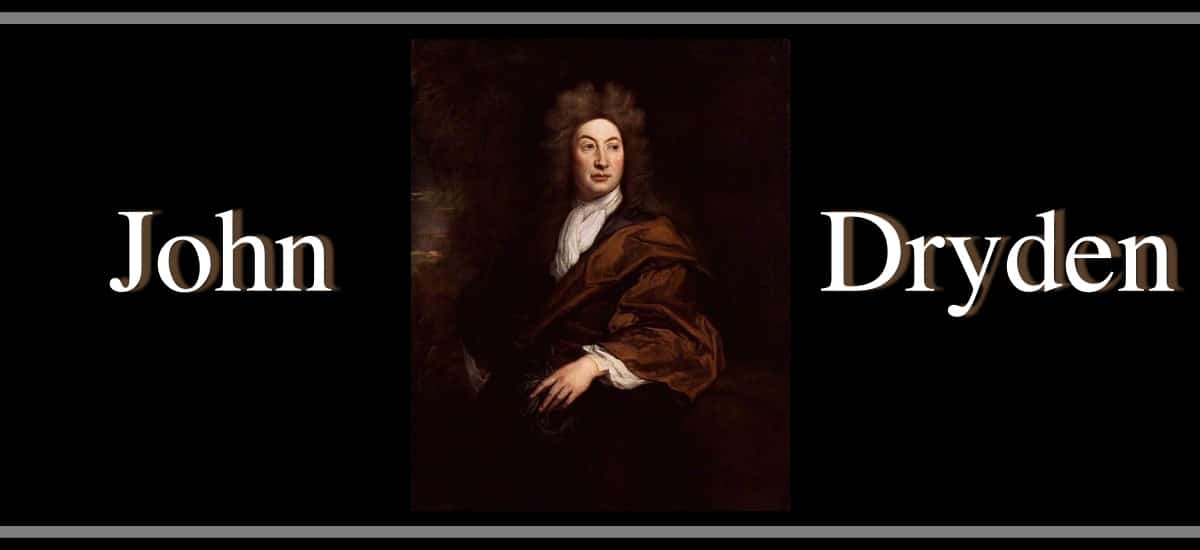
Portrait by the German painter Gottfried Kneller. National Gallery in London.
John Dryden was a poet, playwright and literary critic, and also the main figure literary period of the English restoration of Carlos II. In fact, it came to be known as the Dryden era. Today they are fulfilled 320 years of his death. I review his biography and select some phrases and fragments of his works.
John Dryden
John Dryden was born in aldwinkle (Northamptonshire) in 1631 in a Puritan family with fourteen children.
I study in the Westminster School and Trinity College from Cambridge, and was working on London with the Secretary of State of Cromwell. But from a very young age he began to publish poetry.
Got married with Lady elizabeth howard and he had three children and wrote plays after the theaters, closed by Puritan prohibition, were reopened. With them, apart from good benefits, he set the trend and style that would be distinguished in the call Comedy of the Restoration. Thus he also achieved recognition as one of the most important playwrights in the country. And also highlighted how classic translator Latin and Greek.
Some of his most famous works were:
Virgil's works, The medal, Heroic stays, The Tempest, Essay on dramatic poetry, Absalom and Ajitofel (with clear echoes of John Milton and his Lost paradise), An afternoon love, The Indian emperor, The conquest of Granada, fashionable marriage, All for love, The doe and the panther or on Ode to Saint Cecilia.
He died May 12, 1700 and His remains rest in the famous corner of the poets of the Westminster Abbey in London.
Chosen phrases
- The home should be the sacred refuge of life.
- Errors, like blades, are lost in the world; If you want to search for pearls, you have to go very deep.
- This is the clay porcelain of mankind.
- Love is the noblest weakness of spirit.
- Madness is a certain pleasure that only the madman knows.
- Only man hinders happiness by destroying what could actually be.
- Pains of love are much sweeter than all other pleasures.
- All empires are nothing but power in trust.
- Great was his wealth, but greater was his heart.
- She does not feel the danger, because she does not know sin.
- I'm a little hurt, but I'm not dead. I'll lay down to bleed for a while. Then I'll get up to fight again.
- All the happiness that Humanity can achieve is not in pleasure, but in rest from pain.
- Love is the noblest weakness of spirit.
Ode to Saint Cecilia (fragment)
It was written in 1687 commissioned by the London Musical Society that had already organized a few years ago an annual festival for November 22, in honor of the patron saint of music.
This poem, which extols the music power to achieve harmony in a world full of chaos and invites us to fully feel it in our lives. The composer Friedrich Handel put music in the form of cantata en 1739.
Divine Music
What passion does not awaken and does not dominate?
When glorious jubal
The harp of songs made strings,
Around his brothers listened to him,
And even to the dust the foreheads bowed
Reverence the sovereign spell.
That no less than a god they imagined
Keep that wonder
That he spoke to them with such sweet breath.
Divine Music
What passion does not awaken and does not dominate?
Send bellicose horn
That the lid is already broken,
And the anger fuels, and the battle
What storm breaks.
The redoubling, the tremendous redoubling
Of hoarse drummers
Encourage the stubborn fighters,
Go ahead! go ahead! repeating.
Sweet consoles
The wailing flute
With loving sorrow
Of the shy one adores,
Of whom hopes cries.
Voiced violin expresses
Impetus of the one who loves
A disdainful lady;
The jealousy that is prey,
The rage that inflames him.